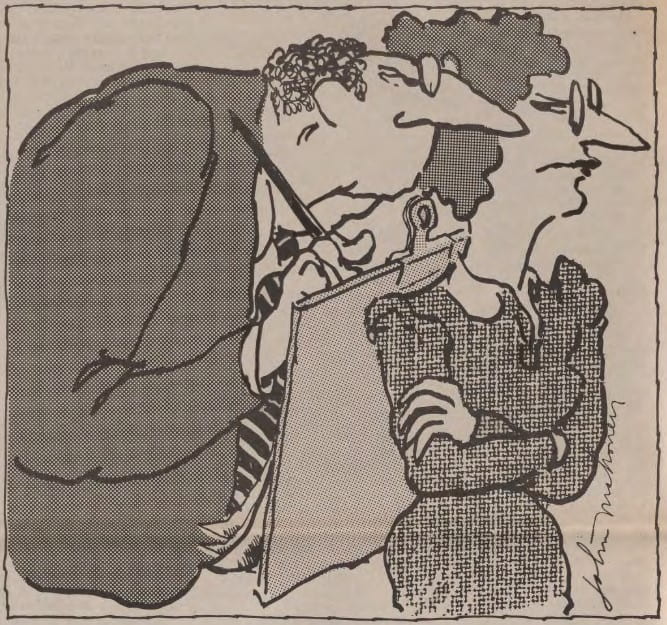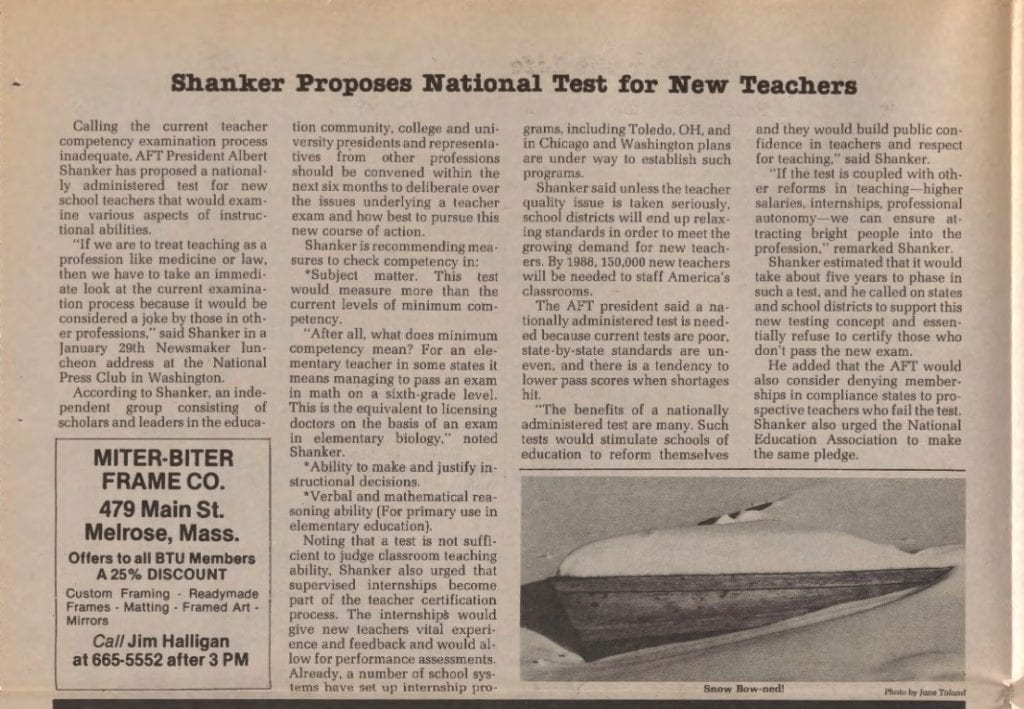When it comes to school evaluations, student grades by teachers probably come to mind. However, the winter of 1985 saw the teachers of the Boston Teachers Union (BTU) confront a very different kind of assessment: the Boston Public School (BPS) administration and its evaluation of its teaching staff. The cartoon below, published in the January 1985 issue of the Boston Union Teacher, captured the problem: busybody administrators and superintendents looking for reasons to fail teachers and keeping them from educating children. What was going on that school year and how did teacher evaluations play a role?

Massachusetts Boston: “Boston Teachers Union Collection.”
Evaluating the Evaluators
Published in the January 1985 issue of the Boston Union Teacher, the above political cartoon headlined an article by BTU leader Ed Doherty concerning teachers’ growing troubles with the new system of teacher evaluations established in 1980. Reflecting his leading image – an intrusive higher up giving a teacher little space or respect – Doherty held both administrators and superintendents culpable for creating a faulty evaluation system, one that:
- “Is inconsistent in its purpose”
- “Fails to establish any specific standards of performance”
- “Allows for a totally inconsistent application of the evaluation program”
- “Relies too heavily on a single administrator’s subject judgement based on vague criteria”
As Ed Doherty pointed out, BPS teachers had little chance to improve their methods while risking a black mark on their professional record thanks to the opinion of a single evaluator. His prescribed remedy lay with scrapping the current evaluation system and constructing a better one based on improving teaching, collegiality, multiple judges, and concise criteria.
Establishing Rights
Even as Ed Doherty and the Boston Union Teacher condemned the new BPS teacher evaluation system, it sought to prepare teachers for the long haul. The following month, Richard Stutman wrote “Performance Evaluation: Know Your Rights,” a page 5 article detailing the legal and professional rights of educators in the 1980 system. Central to Stutman’s case was the contract and the evaluation procedures outlined within. Although the system could only be “as fair as the administrators implementing it,” a point repeatedly emphasized by Stutman, teachers had the letter of the law – the guidelines and procedures – to find some footing against biased administrators. So what rights did BPS teachers have under the contract? Several:
- The right to comprehensive explanation
- A follow-up conference
- An interim report (a copy of the evaluation form)
- The right to comment/respond
- Reception of the overall rating by May 15th
- The right to grieve

Massachusetts Boston: “Boston Teachers Union Collection.”
At the same time, Stutman noted that these rights stood on shaky ground, especially against a hostile administration. Administrators and superintendents could twist the words and actions of teachers and Stutman advised his colleagues to keep comprehensive communications logs. In the fight over evaluations, teachers needed every tool in their arsenal.
The AFT Steps In

Massachusetts Boston: “Boston Teachers Union Collection.”
Fortunately, the BTU had allies in the the American Federation of Teachers (AFT). As a local of the AFT (Local 66 to be precise), the BTU’s struggle against incompetent evaluations in Boston reflected a broader problem in the American education system, an issue greatly affecting the AFT. On page 12 of the March 1985 Boston Union Teacher issue, the article “Shanker Proposes National Test For New Teachers” detailed the proposal of then-AFT President Albert Shanker for a nationally administered test for teachers assembled by independent, expert input. This new test would measure competency in subject matter, instructional decision making, and verbal and mathematical reasoning. Shanker also suggested accompanying this initiative with a national teacher internship program, rejecting the notion of a single test to measure comprehensively a teacher’s capability. At stake, the AFT president would claim, was teacher quality and an inability to enact systemic reform.
The concern expressed by Shanker grew out of the chaotic response to the April 1983 A Nation At Risk report published by the Reagan administration’s Department of Education. The report launched widespread hysteria about school and teacher quality, which education stakeholders like the AFT and BTU had to respond. As a traditional unionist who pushed the rhetoric of “professionalism,” Shanker advocated for a flurry of tests, qualification exams, and other methods of evaluation to “upgrade” and “professionalize” teachers. Pressured by A Nation At Risk, the AFT and BTU fought for evaluations on their own terms.
So What Happened Next?
After the March 1985 issue of the Boston Union Teacher, the newspaper falls noticeably quiet on the issue of teacher evaluations. Where did the struggle go from there? How did evaluations change? The relatability of the header image – a busybody administrator creeping over a teacher’s shoulder – to the policing of teachers in the present day would suggest that the trouble still persists in some form. The struggle of the Boston Teachers Union continues on, mirrored in both past and present.